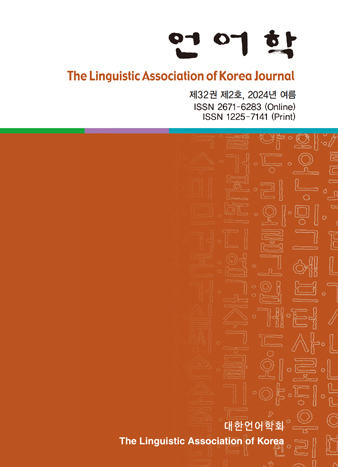대한언어학회 전자저널
32권 2호 (2024년 6월)
- Bound Noun tus in Korean
-
Tae Sik Kim
Pages : 103-120
Abstract
Kim, Tae Sik. (2024). Bound noun tus in Korean. The Linguistic Association of Korea Journal, 32(2), 103-120. This paper discusses the grammaticalization process of a bound noun tus in Korean. Broadly, Choi (2017) proposes two different types of tus in Korean-a bound noun in Syntax and a non-final ending in Morphology with an adverbial use. The two types are distinguished by whether or not tus can be followed by i which is an alleged adverbial derivational affix in Choi (2017). Choi (2017) further argues that the bound noun tus is grammaticalized into the morphological ending tus. However, we find some problems with the categorization: the two types show a different NPI licensing pattern, and the alleged adverbial affix i does not behave like a true adverbial affix i. Instead, I argue that both are a linguistic object in Syntax. The bound noun type of tus merges in N and cyclically moves to Mod. The adverbial type of tus directly merges in Mod without any movement. The two different structures are intertwined by the process of grammaticalization.
Keywords
# bound noun # grammaticalization # tus # reanalysis # epistemic modal
References
- Choe, H.-S. (1988). Restructuring Parameters and Comlex Predicates; A Transformational Approach. Doctoral Dissertation. MIT.
- Choi, D.-H. (2017). Uyconmyengsa 'tus'uy pyenchenkwa emihwa kwaceng (A transition and ending process of dependent noun ‘Deut’). Yengcwuemwun, 35, 153-175.
- Kim, T. S. (2016). Bound nouns, ellipsis or pro-form?. Studies in Generative Grammar, 26(1), 1-14.
- Korea University Korean Dictionary. (2009). Korea University Research Institute of Korean Studies.
- Roberts, I., & Roussou, A. (2003). Syntactic Change: A Minimalist Approach to Grammaticalization. Cambridge, NY: Cambridge University Press.
- Sohn, K.-W. (1996) Negative Polarity items, Scope, and Economy. Seoul: Thayhaksa.
- Standard Korean Language Dictionary. (1999). The National Institute of Korean Language.
- van Gelderen, E. (2004). Grammaticalization as Economy. Amsterdam: John Benjamins.
